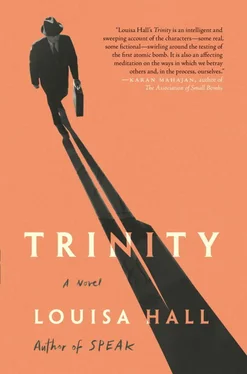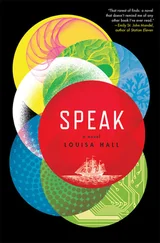These are the kinds of incidental anecdotes I collected. I knew, of course, that in my research I should be focusing on the bombings of Hiroshima and Nagasaki, but it was hard for me to effectively do so.
It’s difficult to focus on enormous tragedies: 129,000 dead, or approximately 129,000 dead, because the chaos in those cities was such that no one will ever know exactly how many lives were affected.
What does that number mean? In those days of research, my mind couldn’t contain a number like that. It’s hard enough, I thought, to focus on the facts surrounding one death. It’s hard enough to make sense of the repercussions of a single betrayal.
Of course I knew, even then, that the two acts can’t be compared. A betrayal is only a betrayal, even if it feels like a murder.
Even if, perhaps, it’s the only possible way to ever really feel what it is to be murdered, because if we were actually murdered, we wouldn’t feel it, at least not at length, and probably not with the attention to detail that we’re able to register in the wake of betrayal.
In other words, or so I thought while I researched the effects of Oppenheimer’s work, there’s no way to obsessively ruminate over the facts of our own murder. Only a betrayal really feels—over time, in a way that can last, in a way we hold on to forever—like a murder.
And in some ways, I told myself, if you think about it too much, a betrayal is a kind of murder, because no man or woman is ever the same after he or she’s been betrayed, and no woman or man—except, perhaps, the most craven sociopath—is ever the same after she or he’s committed an act of betrayal.
So a betrayal—or so I told myself, sitting at the microfiche— is a murder in some ways, a murder of the betrayed as she was, and the betrayer as he was. A murder of who they were together, as a couple, or a pair, an interlocking, undifferentiable system in which the two parts depend on each other.
All of which explains, perhaps, I told myself while sitting in the library, why we never tried Oppenheimer, or anyone else involved in the Manhattan Project, or General Groves, or President Truman, or the country that voted for President Truman, for their decision to take part in a program that killed 129,000 people when, according to most historians, the war had already essentially been won, Germany having already surrendered, Japan no longer even rousing itself to defend its cities from airborne attacks, and the Soviets having already agreed to join the fight in the Pacific.
But we didn’t hold any trials for that. Instead, we tried Oppenheimer for lying. We tried him for betraying his friends, his wife, and his country.
IN THOSE DAYS LEADING UP TO MY TRIP TO PRINCETON, THOUGH Iknew I was focusing on the wrong thing, it was to his security hearings—in which friends and companions and enemies of Oppenheimer were asked, over and over again, how well they knew him, if he’d deceived them, whether or not they felt he could be trusted—that my attention was drawn.
Over and over again, I found myself returning to the transcripts of that unofficial trial that was held in a secret room with no windows, with two long tables organized in the shape of a T, the judges sitting along the top branch, Oppenheimer alone at the base, and Kitty sitting behind him on a sofa they dragged into the room, her leg immobilized in a cast.
At length, for days on end, Kitty sat on that sofa, and Oppenheimer sat alone at the base, and the prosecutors along one side of the T questioned him on the documented falsehoods he’d told.
From the beginning of the trial, his answers are completely unhelpful. Though he admits from the start that he lied about his trip to visit Jean Tatlock, and also about the conversations he had with Haakon Chevalier, he provides entirely unsatisfactory reasons. The prosecutors press him for more detail, but he simply can’t rise to the level they want. “When you ask,” he says at one point, “for a more persuasive argument as to why I did this than that I was an idiot, I am going to have more trouble being understandable.”
Later, he tries again: “Whether I embroidered the story in order to underline the seriousness, or whether I embroidered it to make it more tolerable that I would not tell the simple facts . . . I don’t know.”
And later: “I think I need to say that it was essential that I tell this story, that I should have told it at once and should have told it completely accurately, but that it was a matter of conflict for me and I found myself, I believe, trying to give a tip to the intelligence people without realizing that when you give a tip you must tell the whole story. When I was asked to elaborate, I started off on a false pattern.”
Later, growing frustrated with his attempts to explain why he lied in the first place, the prosecutors ask why, having started on a false pattern, he failed to correct it. And again, in his answer, he comes up short.
“I wish I could explain,” he concludes—and as I read his response I remembered the doglike expression on my husband’s face, that animal look, the expression of a creature who has no way of explaining to himself or to others why he has behaved in such a manner—“I wish I could explain to you better why I falsified and fabricated.”
IN DECEMBER, HAVING RUN OUT OF TIME TO FINISH MY RESEARCH, Ileft my son with my neighbor and flew to New York. Then, on the train down to Princeton, while the world of winter colors rushed by, I remembered how I’d admired Oppenheimer when I was a girl, when he stood in my parents’ living room with such melancholy forbearance when Kitty lurched toward him and told him she loved him. I thought of how he’d looked down at her in that woman’s arms, then reached to collect her, and wrap her in her mink, and guide her gently out of the party.
From the station, I could have taken a taxi, but I decided to walk. It was a cold, unpleasant day, one of those winter afternoons when the sky hangs low overhead, gray as an old rag. Under that sky, I walked along the same streets I’d walked along so many centuries ago when I was a child: picking up candy from the store with my sister, collecting horse chestnuts alone, watching mallards swim in the pond.
For a moment, I paused on the corner of the street I grew up on. I could have walked to our old house. I could have rung the bell. I could have stepped into that same living room where my sister and I watched that Christmas party from the landing of the carpeted stairs, where my father sometimes called my mother to play the piano in front of his guests, where he used to sharpen the knives so close to her face and once, when he was goading her into a response and she wouldn’t give in, he pushed her into the hearth so that she knocked her head on the stone and slid slowly down to the ground, and afterward—when she wasn’t responding—he leaned down in remorse and picked her up so tenderly, like a child, and carried her gently upstairs to the bedroom.
Now my mother was dead, not because of the violence we waited for and expected, but because of an illness, which slipped in and took her when we weren’t paying attention, and I hadn’t spoken to my father in over a year.
On the corner, I stopped for a moment, as if to turn and walk down the street. As if I planned to go in again through that door, and call out in the foyer, as I used to call for my mother.
But then I kept walking. As I headed toward campus, I thought about the kindness that so often comes in the wake of some cruelty: My father, stooping to tenderly pick up my mother. Or Oppenheimer, gently guiding Kitty out of the party. Or even my husband, kneeling and saying I love you, when of course by then he was already leaving.
Читать дальше












